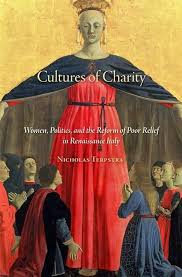Cultures of Charity: Women, Politics, and the Reform of Poor Relief in Renaissance Italy – Nicholas Terpstra

Author: Nicholas Terpstra
Publisher: Harvard University Press
Year of Publication: 2013
Print Length: 400 pages
Genre: Non-Fiction / Cultural Studies, Non-Fiction / Politics & Political Science
Area: Italy
Topic: Alms, Charity, Class, Culture & Society, Gender, Politics & Power, Poverty, Woman and Femininity
Renaissance Italians pioneered radical changes in ways of helping the poor, including orphanages, workhouses, pawnshops, and women’s shelters. Nicholas Terpstra shows that gender was the key factor driving innovation. Most of the recipients of charity were women. The most creative new plans focused on features of women’s poverty like illegitimate births, hunger, unemployment, and domestic violence. Signal features of the reforms, from forced labor to new instruments of saving and lending, were devised specifically to help young women get a start in life.
Cultures of Charity is the first book to see women’s poverty as the key factor driving changes to poor relief. These changes generated intense political debates as proponents of republican democracy challenged more elitist and authoritarian forms of government emerging at the time. Should taxes fund poor relief? Could forced labor help build local industry? Focusing on Bologna, Terpstra looks at how these fights around politics and gender generated pioneering forms of poor relief, including early examples of maternity benefits, unemployment insurance, food stamps, and credit union savings plans.
Table of Contents
List of Figures and Tables
Introduction
1. Showing the Poor a Good Time: Gender, Class, and Charitable Cultures
Two Cultures of Charity
“Good Mothers of the Family”
2. Worthy Poor, Worthy Rich: Women’s Poverty and Charitable Institutions
The Turning Wheel: Charitable Institutions and Life Cycle Poverty
The Critical Decade
Nights and Days at the Opera
3. Tightening Control: The Narrowing Politics of Charity
Making It Work
People versus Patricians: Civil Society and Controlling Charity
4. Meeting the Bottom Line: Alms, Taxes, Work, and Legacies
Begging for Beggars: Keeping the Opera Pia dei Poveri
Mendicanti Afl oat
Taxation by Other Means
Making a Workhouse
Deeper in Debt and Richer all the Time: Building a Legacy
5. The Wheel Keeps Turning: Moving Beyond the Opera
Enclosing the Circle: Shelters and the Reform of Poor Women
Credit Where Credit Was Due: Investing in Marriage
Beyond Charity: Mutual Assistance and the Working Poor
6. Baroque Piety and the Qualità of Mercy
Bringing Discipline to Practical Charity
The Aesthetics of Poverty and the Qualità of Mercy
Notes
Bibliography
Acknowledgments
Index

Nicholas Terpstra is Professor of History at the University of Toronto. His research lies at the intersection of politics, religion, gender, and charity, with a focus on issues dealing with poverty, institutional structures of charity, and urban space & the senses in Renaissance Italy. Recent books include Lost Girls: Sex & Death in Renaissance Florence (2010), Cultures of Charity: Women, Politics, and the Reform of Poor Relief in Renaissance Italy (2013), Religious Refugees of the Early Modern World (2015), and Mapping Space, Sense, and Movement in Florence (2016). He has held visiting professor positions at various universities and at Villa I Tatti. From 2012-17, he was Editor of Renaissance Quarterly.
Source: https://itatti.harvard.edu/people/nicholas-terpstra
More from Nicholas Terpstra in this library, click here.
